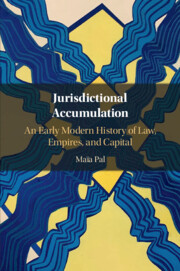Book contents
- Jurisdictional Accumulation
- Jurisdictional Accumulation
- Copyright page
- Dedication
- Epigraph
- Contents
- Acknowledgements
- Introduction
- 1 Early Modern Extraterritoriality
- 2 Historical Sociology, Marxism, and Law
- 3 Social Property Relations
- 4 Ambassadors
- 5 Consuls
- 6 Colonial Practices of Jurisdictional Accumulation
- 7 Analytical Crossroads
- Epilogue
- Bibliography
- Index
1 - Early Modern Extraterritoriality
Published online by Cambridge University Press: 15 October 2020
- Jurisdictional Accumulation
- Jurisdictional Accumulation
- Copyright page
- Dedication
- Epigraph
- Contents
- Acknowledgements
- Introduction
- 1 Early Modern Extraterritoriality
- 2 Historical Sociology, Marxism, and Law
- 3 Social Property Relations
- 4 Ambassadors
- 5 Consuls
- 6 Colonial Practices of Jurisdictional Accumulation
- 7 Analytical Crossroads
- Epilogue
- Bibliography
- Index
Summary
Chapter 1 problematises the classic history of diplomacy in relation to extraterritoriality and presents the key debates in IR and international law to which this study contributes. This chapter further shows that classic diplomatic history's focus on embassies and Grotius to historicise extraterritoriality has contributed to the Westphalian imaginaries that remain dominant and maintain linear trajectories of the shift from personal to territorial concepts of sovereignty. If a range of new studies, focused on biographical and cultural aspects of diplomacy, are also contesting this approach and account of early modern jurisdiction, they nevertheless remain limited in terms of not fundamentally questioning the link between extraterritorial and territorial sovereignty based on the analysis of ambassadorial immunity and the shift from the personal – the ambassador – to the territorial – the embassy. These limitations call for new approaches to the history of extraterritoriality.
Keywords
- Type
- Chapter
- Information
- Jurisdictional AccumulationAn Early Modern History of Law, Empires, and Capital, pp. 25 - 47Publisher: Cambridge University PressPrint publication year: 2020

